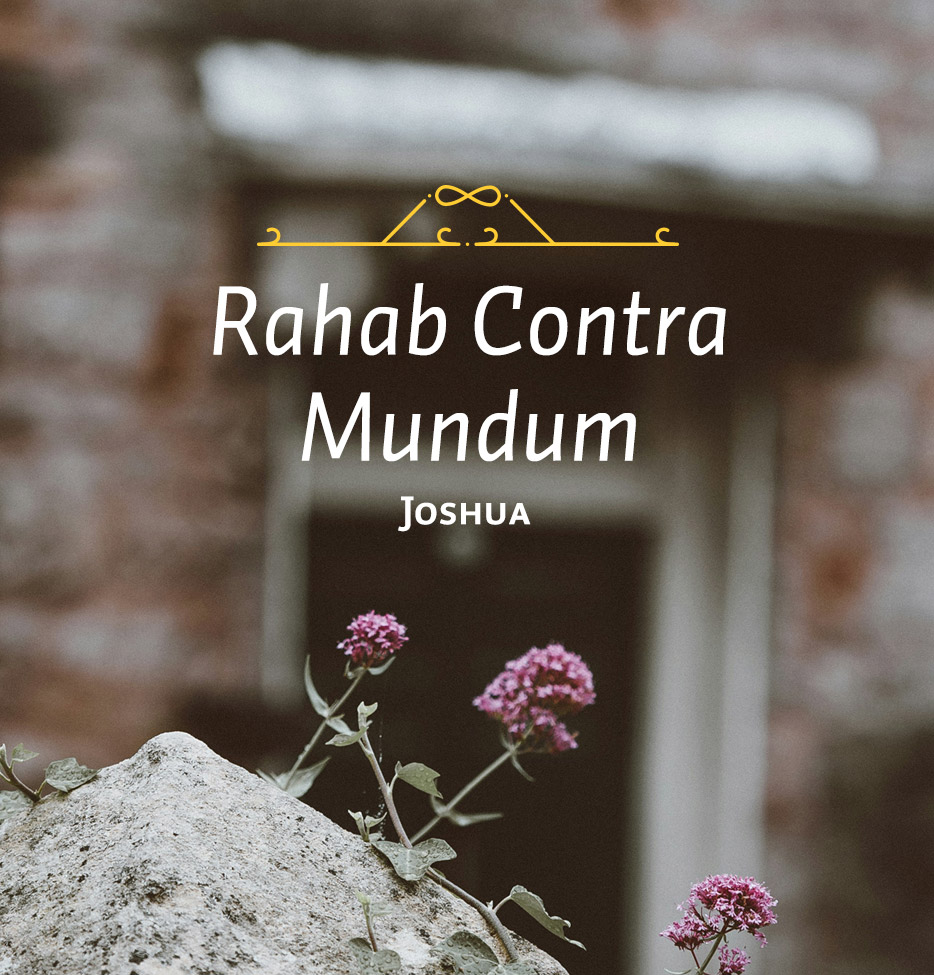I started out by saying that this is a story of God’s mercy, which indeed it is. When the spies arranged to save her life, they said that she was to tie a scarlet cord in her window. That was to mark the house, such that no one would touch it when the Israelites came. It was a powerful symbol of her deliverance. Going all the way back to Clement of Rome, there has been a tradition to trace the scarlet cord through Scripture and see it pointing to the blood of Christ. It’s called “the line of the blood,” beginning with Abel’s sacrifice of the lamb and leading to Calvary. It is through the mark of the blood that we are saved.
Now I don’t know whether that’s reading too much into it or not. It may be. But what Rahab was to do was strikingly parallel to what the Jewish people were to do at the time of the exodus from Egypt, when they were to take the blood of the lamb and mark the lintel and the doorposts of their houses so that the angel of death might pass over.
Now let me say as I close that it’s also our story if you understand it correctly. We’re the Rahabs of this world. Our background is her background, and our salvation is exactly what she experienced. And furthermore, we are a part of, and dwell in the midst of, a wicked people; and we too have our own sins. It might not have been the sin of prostitution, though it may have been. But whatever it is, it’s our sin. We know what it is. And so, in our alienated state, like the citizens of Jericho, we have found ourselves under the judgment of God awaiting that which is certainly due to us for our sin.
But then what happened? God allowed us to hear the gospel, the good news, to find out who He was, that the real God is not the gods of the people among whom we live—those false gods, those images that we throw up to make ourselves feel better. But we heard about the real God, the God of the Old Testament, the God of the New Testament, the God of Jesus Christ, the God who died for us to provide our salvation. And we had messengers come, representatives of that God, to teach us about Him. And by the grace of God, just as in the case of Rahab, we believe that. And also like Rahab, that faith produced works in us, and we began to live differently. We began to live as Rahab did against the world because, you see, our situation now is the situation in which she found herself between the moment of her belief and the time of her deliverance when Jericho was destroyed.
Like her, we live in the midst of that kind of a pagan city. We believe on God, the true God; but the deliverance that we anticipate is not yet. So we live in faith, and we live boldly against the culture because it’s a culture contrary to the culture of our God. We say, as Rahab did, and Athanasius did, and all the other great saints have done in their own historical situations for thousands upon thousands of years, “Here I stand against the world because I stand for God and His righteousness.” What am I to say to you if you’re a person who, in the symbolism of this story, are not like Rahab but are still living in Jericho, living there in unbelief? You may be deluding yourself. You may be looking around at the walls. You may be saying, as the citizens of Jericho must have said, “Well, we don’t have a whole lot to fear. Look at these walls, these big, thick walls. As long as we’re surrounded by our secular embattlements, we’re safe. And besides, Jericho has been here for thousands of years. Look how long our secular culture has endured. Why, we’re alright. We don’t need the God of Israel.”
And yet, I wonder if it’s not the case, as it was of the citizens of Jericho, that, internally, your heart is failing you with fear. You’re saying to yourself, “What if this God really is all-powerful? What if this God really is the true God? What if this God really does demand righteousness and holiness of life? What if there really is a final judgment? What if I must really stand before Him one day?” If you’ve gotten to that point, let me say that you don’t have to remain in unbelief any longer. Rahab must have been there herself at one time. But she passed from unbelief to faith. And as she passed from unbelief to faith, she passed not only from the kingdom of the Amorites into the kingdom of the Jews; she passed from the kingdom of Satan’s darkness into the kingdom of God’s light. That’s what you need. You need only to put your life in the hands of that God and say, “I know that that’s the true God, and that’s the God I’m going to follow regardless of the standards or pressures of my culture.” That God will save you. He has done it before. That God will do it again. That God will do it now if you’ll trust Him as Rahab did.






